MGMT3001: Geely's Acquisition of Volvo - Global Market Impact Essay
VerifiedAdded on 2020/10/07
|10
|3046
|73
Essay
AI Summary
This essay analyzes Geely's acquisition of Volvo, exploring its strategic implications in the global car market. It examines the horizontal acquisition, the integration of Volvo's brand and technology, and Geely's competitive advantages through the Resource-Based View (RBV) framework, BCG matrix, and Porter's 5 Forces model. The essay discusses the challenges of cultural integration, financial investments, and competition within the automotive industry. It highlights how Geely leverages Volvo's brand equity and technological advancements to gain a stronger market position, despite facing competition and potential cultural clashes. The analysis concludes by assessing Geely's successes and challenges in the acquisition, providing insights into its ability to compete in the global automotive landscape.
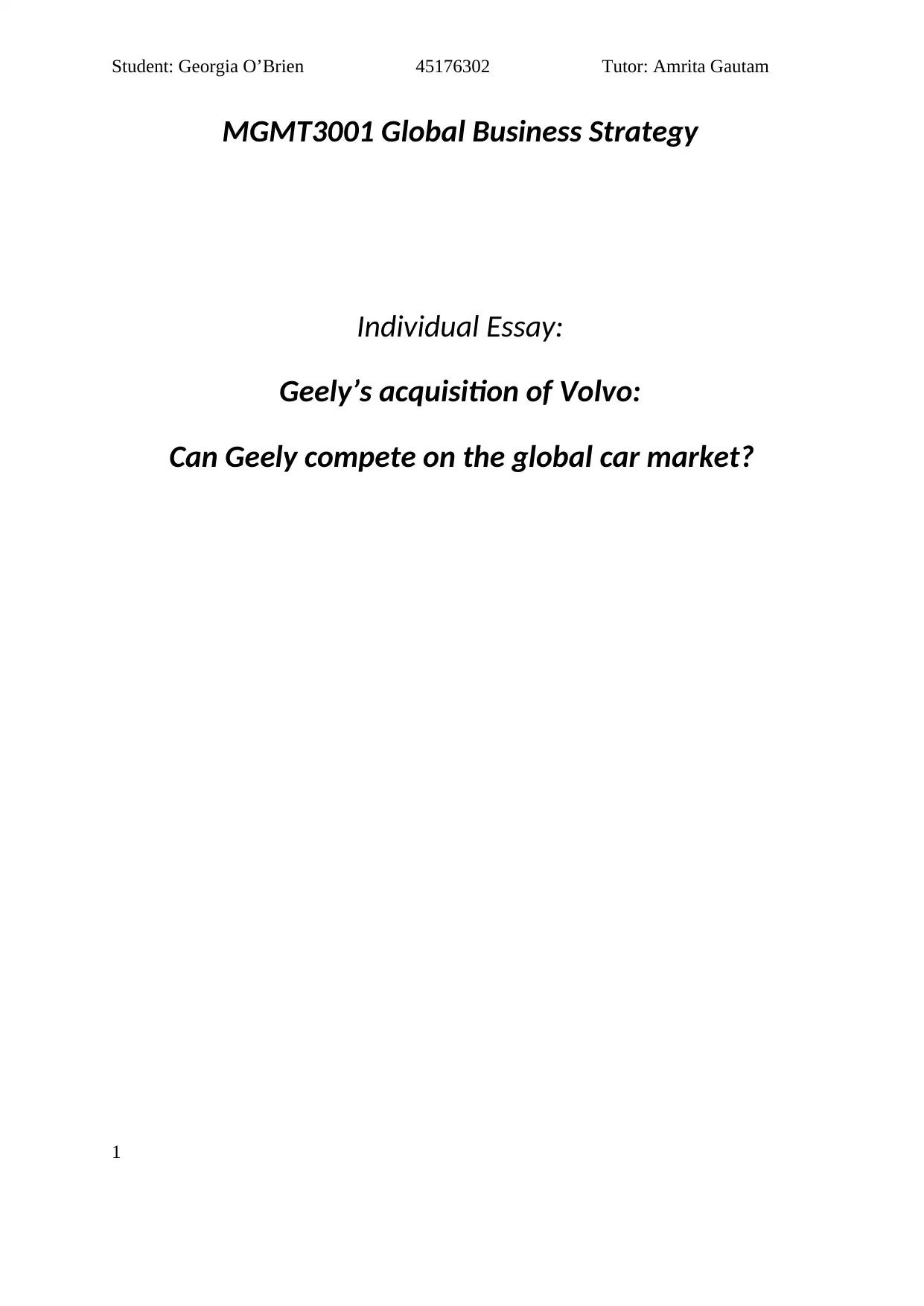
Student: Georgia O’Brien 45176302 Tutor: Amrita Gautam
MGMT3001 Global Business Strategy
Individual Essay:
Geely’s acquisition of Volvo:
Can Geely compete on the global car market?
1
MGMT3001 Global Business Strategy
Individual Essay:
Geely’s acquisition of Volvo:
Can Geely compete on the global car market?
1
Paraphrase This Document
Need a fresh take? Get an instant paraphrase of this document with our AI Paraphraser
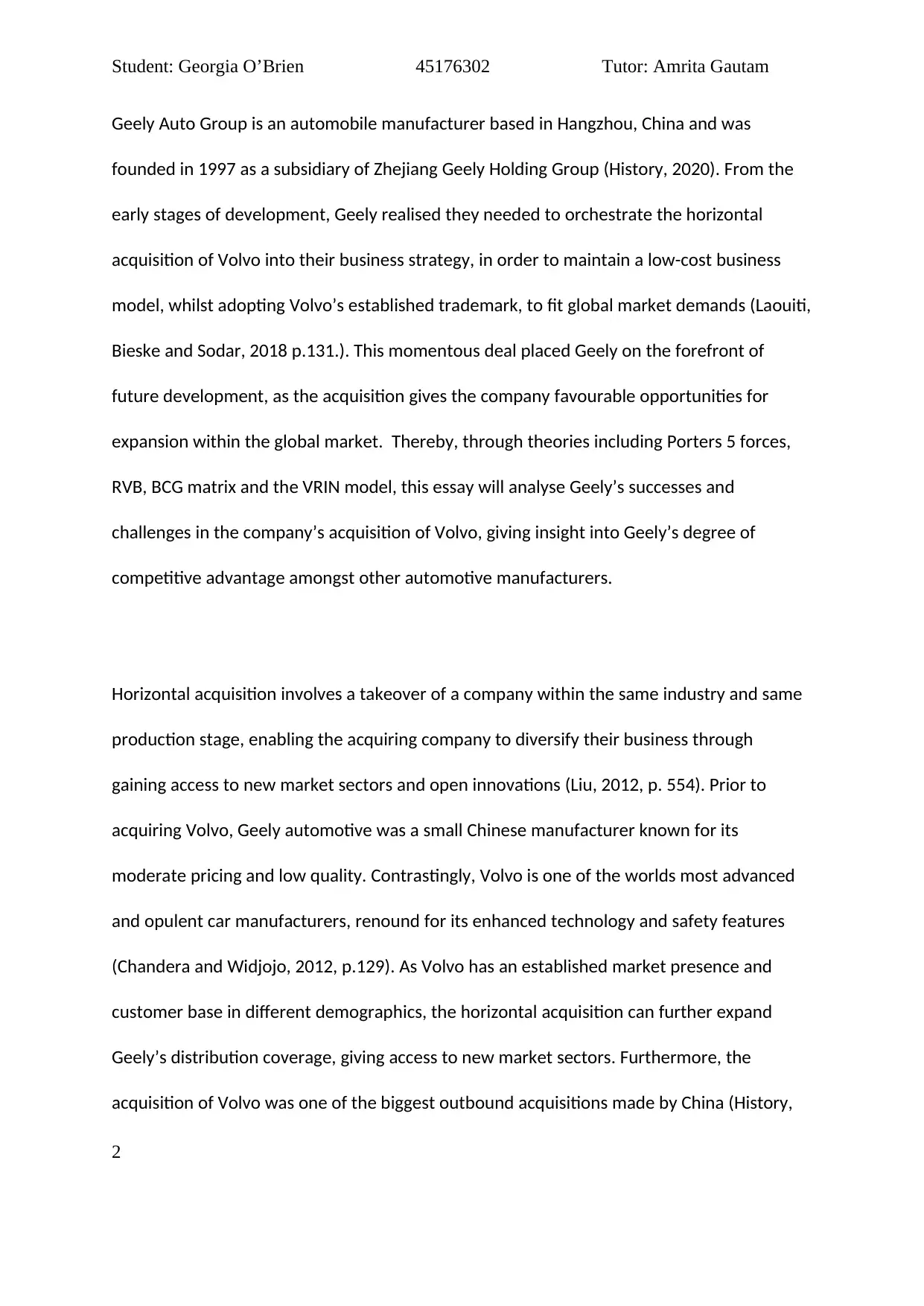
Student: Georgia O’Brien 45176302 Tutor: Amrita Gautam
Geely Auto Group is an automobile manufacturer based in Hangzhou, China and was
founded in 1997 as a subsidiary of Zhejiang Geely Holding Group (History, 2020). From the
early stages of development, Geely realised they needed to orchestrate the horizontal
acquisition of Volvo into their business strategy, in order to maintain a low-cost business
model, whilst adopting Volvo’s established trademark, to fit global market demands (Laouiti,
Bieske and Sodar, 2018 p.131.). This momentous deal placed Geely on the forefront of
future development, as the acquisition gives the company favourable opportunities for
expansion within the global market. Thereby, through theories including Porters 5 forces,
RVB, BCG matrix and the VRIN model, this essay will analyse Geely’s successes and
challenges in the company’s acquisition of Volvo, giving insight into Geely’s degree of
competitive advantage amongst other automotive manufacturers.
Horizontal acquisition involves a takeover of a company within the same industry and same
production stage, enabling the acquiring company to diversify their business through
gaining access to new market sectors and open innovations (Liu, 2012, p. 554). Prior to
acquiring Volvo, Geely automotive was a small Chinese manufacturer known for its
moderate pricing and low quality. Contrastingly, Volvo is one of the worlds most advanced
and opulent car manufacturers, renound for its enhanced technology and safety features
(Chandera and Widjojo, 2012, p.129). As Volvo has an established market presence and
customer base in different demographics, the horizontal acquisition can further expand
Geely’s distribution coverage, giving access to new market sectors. Furthermore, the
acquisition of Volvo was one of the biggest outbound acquisitions made by China (History,
2
Geely Auto Group is an automobile manufacturer based in Hangzhou, China and was
founded in 1997 as a subsidiary of Zhejiang Geely Holding Group (History, 2020). From the
early stages of development, Geely realised they needed to orchestrate the horizontal
acquisition of Volvo into their business strategy, in order to maintain a low-cost business
model, whilst adopting Volvo’s established trademark, to fit global market demands (Laouiti,
Bieske and Sodar, 2018 p.131.). This momentous deal placed Geely on the forefront of
future development, as the acquisition gives the company favourable opportunities for
expansion within the global market. Thereby, through theories including Porters 5 forces,
RVB, BCG matrix and the VRIN model, this essay will analyse Geely’s successes and
challenges in the company’s acquisition of Volvo, giving insight into Geely’s degree of
competitive advantage amongst other automotive manufacturers.
Horizontal acquisition involves a takeover of a company within the same industry and same
production stage, enabling the acquiring company to diversify their business through
gaining access to new market sectors and open innovations (Liu, 2012, p. 554). Prior to
acquiring Volvo, Geely automotive was a small Chinese manufacturer known for its
moderate pricing and low quality. Contrastingly, Volvo is one of the worlds most advanced
and opulent car manufacturers, renound for its enhanced technology and safety features
(Chandera and Widjojo, 2012, p.129). As Volvo has an established market presence and
customer base in different demographics, the horizontal acquisition can further expand
Geely’s distribution coverage, giving access to new market sectors. Furthermore, the
acquisition of Volvo was one of the biggest outbound acquisitions made by China (History,
2
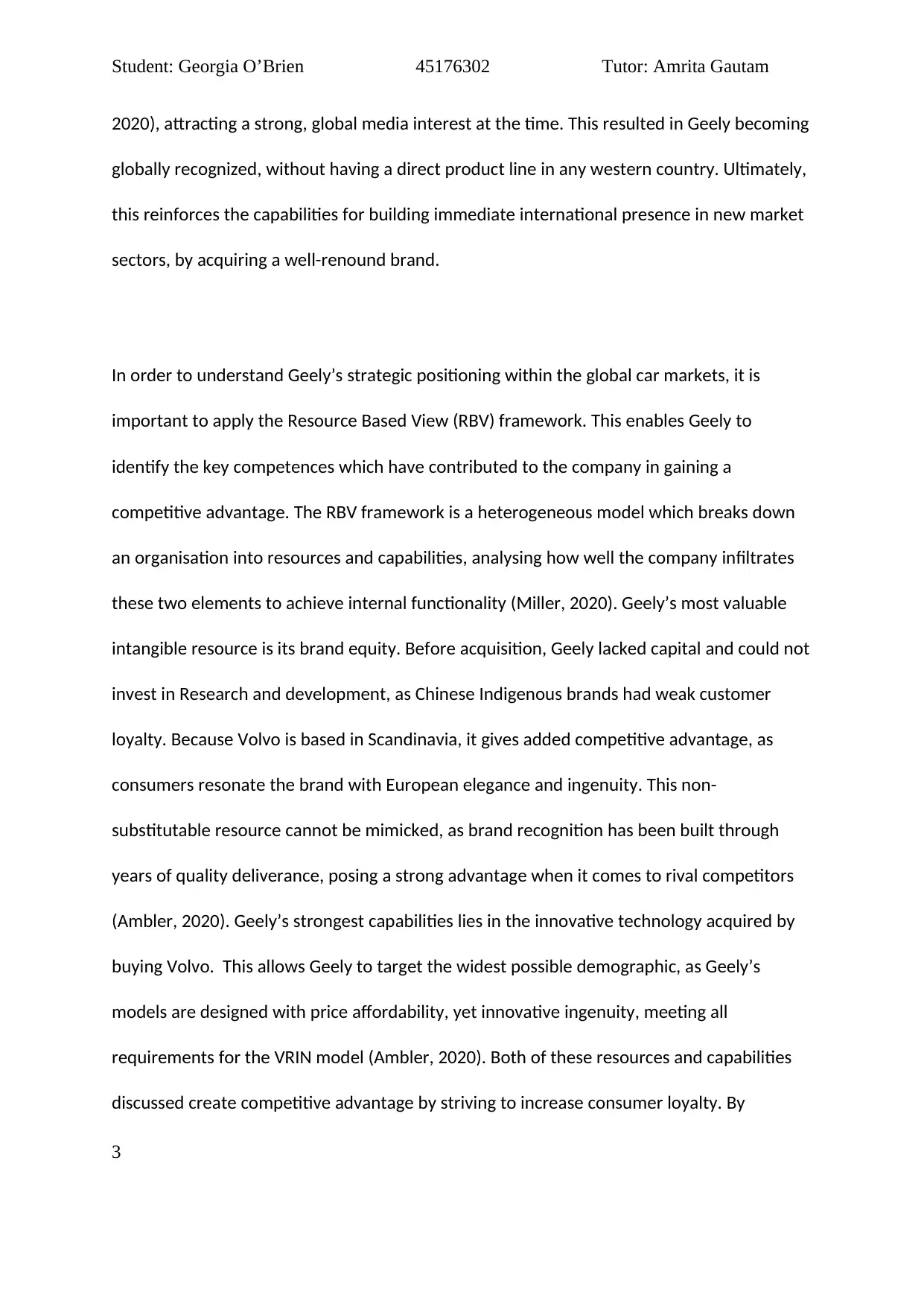
Student: Georgia O’Brien 45176302 Tutor: Amrita Gautam
2020), attracting a strong, global media interest at the time. This resulted in Geely becoming
globally recognized, without having a direct product line in any western country. Ultimately,
this reinforces the capabilities for building immediate international presence in new market
sectors, by acquiring a well-renound brand.
In order to understand Geely’s strategic positioning within the global car markets, it is
important to apply the Resource Based View (RBV) framework. This enables Geely to
identify the key competences which have contributed to the company in gaining a
competitive advantage. The RBV framework is a heterogeneous model which breaks down
an organisation into resources and capabilities, analysing how well the company infiltrates
these two elements to achieve internal functionality (Miller, 2020). Geely’s most valuable
intangible resource is its brand equity. Before acquisition, Geely lacked capital and could not
invest in Research and development, as Chinese Indigenous brands had weak customer
loyalty. Because Volvo is based in Scandinavia, it gives added competitive advantage, as
consumers resonate the brand with European elegance and ingenuity. This non-
substitutable resource cannot be mimicked, as brand recognition has been built through
years of quality deliverance, posing a strong advantage when it comes to rival competitors
(Ambler, 2020). Geely’s strongest capabilities lies in the innovative technology acquired by
buying Volvo. This allows Geely to target the widest possible demographic, as Geely’s
models are designed with price affordability, yet innovative ingenuity, meeting all
requirements for the VRIN model (Ambler, 2020). Both of these resources and capabilities
discussed create competitive advantage by striving to increase consumer loyalty. By
3
2020), attracting a strong, global media interest at the time. This resulted in Geely becoming
globally recognized, without having a direct product line in any western country. Ultimately,
this reinforces the capabilities for building immediate international presence in new market
sectors, by acquiring a well-renound brand.
In order to understand Geely’s strategic positioning within the global car markets, it is
important to apply the Resource Based View (RBV) framework. This enables Geely to
identify the key competences which have contributed to the company in gaining a
competitive advantage. The RBV framework is a heterogeneous model which breaks down
an organisation into resources and capabilities, analysing how well the company infiltrates
these two elements to achieve internal functionality (Miller, 2020). Geely’s most valuable
intangible resource is its brand equity. Before acquisition, Geely lacked capital and could not
invest in Research and development, as Chinese Indigenous brands had weak customer
loyalty. Because Volvo is based in Scandinavia, it gives added competitive advantage, as
consumers resonate the brand with European elegance and ingenuity. This non-
substitutable resource cannot be mimicked, as brand recognition has been built through
years of quality deliverance, posing a strong advantage when it comes to rival competitors
(Ambler, 2020). Geely’s strongest capabilities lies in the innovative technology acquired by
buying Volvo. This allows Geely to target the widest possible demographic, as Geely’s
models are designed with price affordability, yet innovative ingenuity, meeting all
requirements for the VRIN model (Ambler, 2020). Both of these resources and capabilities
discussed create competitive advantage by striving to increase consumer loyalty. By
3
⊘ This is a preview!⊘
Do you want full access?
Subscribe today to unlock all pages.

Trusted by 1+ million students worldwide

Student: Georgia O’Brien 45176302 Tutor: Amrita Gautam
maintaining brand recognition and technological advancements, it will ensure Geely remains
competitive within the global car market, as long as they taper their models to meet the
highest market demands on a global scale.
The Boston Consulting Group (BCG) matrix is an appropriate model in support of Geely
acquiring Volvo to gain a competitive advantage. The BCG matrix analysis of Geely’s
strategic acquisition is referred to in Figure 1. This framework will enable Geely to gain an
insight into how acquiring Volvo will best help them capitalize on market share growth
opportunities within the global automotive industry (Xia and Zhang, 2011, p106 -110). Volvo
is the 20th largest automobile company globally and has an immense capability to increase
it’s market share due to its high valued products (Xia and Zhang, 2011, p. 107). However, the
unprecedented event of the global financial crisis between 2007 and 2009 incurred huge
losses to vehicle manufacturing industry. This was especially true for Volvo, whose total
sales stifled by 30% (Gardini, 2020, p. 193). Thus, during this time, Volvo belonged to the
“question mark” domain, as the company encountered high growth prospects yet low
market share. The ambitious acquisition of Volvo from Ford, cost Geely 1.8 billion, however
its total liabilities and assets have surged to 7 Billion since its acquisition (Gardini, 2020, p.
193). This takeover required that Geely had to invest a large amount of capital into the
company, in order to meet the potential
growth of its market share. The substantial
up-front investment posed huge risk, as the
debt ratio was higher than the international
4
Figure 1: BCG matrix diagram for
Geely acquiring Volvo
maintaining brand recognition and technological advancements, it will ensure Geely remains
competitive within the global car market, as long as they taper their models to meet the
highest market demands on a global scale.
The Boston Consulting Group (BCG) matrix is an appropriate model in support of Geely
acquiring Volvo to gain a competitive advantage. The BCG matrix analysis of Geely’s
strategic acquisition is referred to in Figure 1. This framework will enable Geely to gain an
insight into how acquiring Volvo will best help them capitalize on market share growth
opportunities within the global automotive industry (Xia and Zhang, 2011, p106 -110). Volvo
is the 20th largest automobile company globally and has an immense capability to increase
it’s market share due to its high valued products (Xia and Zhang, 2011, p. 107). However, the
unprecedented event of the global financial crisis between 2007 and 2009 incurred huge
losses to vehicle manufacturing industry. This was especially true for Volvo, whose total
sales stifled by 30% (Gardini, 2020, p. 193). Thus, during this time, Volvo belonged to the
“question mark” domain, as the company encountered high growth prospects yet low
market share. The ambitious acquisition of Volvo from Ford, cost Geely 1.8 billion, however
its total liabilities and assets have surged to 7 Billion since its acquisition (Gardini, 2020, p.
193). This takeover required that Geely had to invest a large amount of capital into the
company, in order to meet the potential
growth of its market share. The substantial
up-front investment posed huge risk, as the
debt ratio was higher than the international
4
Figure 1: BCG matrix diagram for
Geely acquiring Volvo
Paraphrase This Document
Need a fresh take? Get an instant paraphrase of this document with our AI Paraphraser
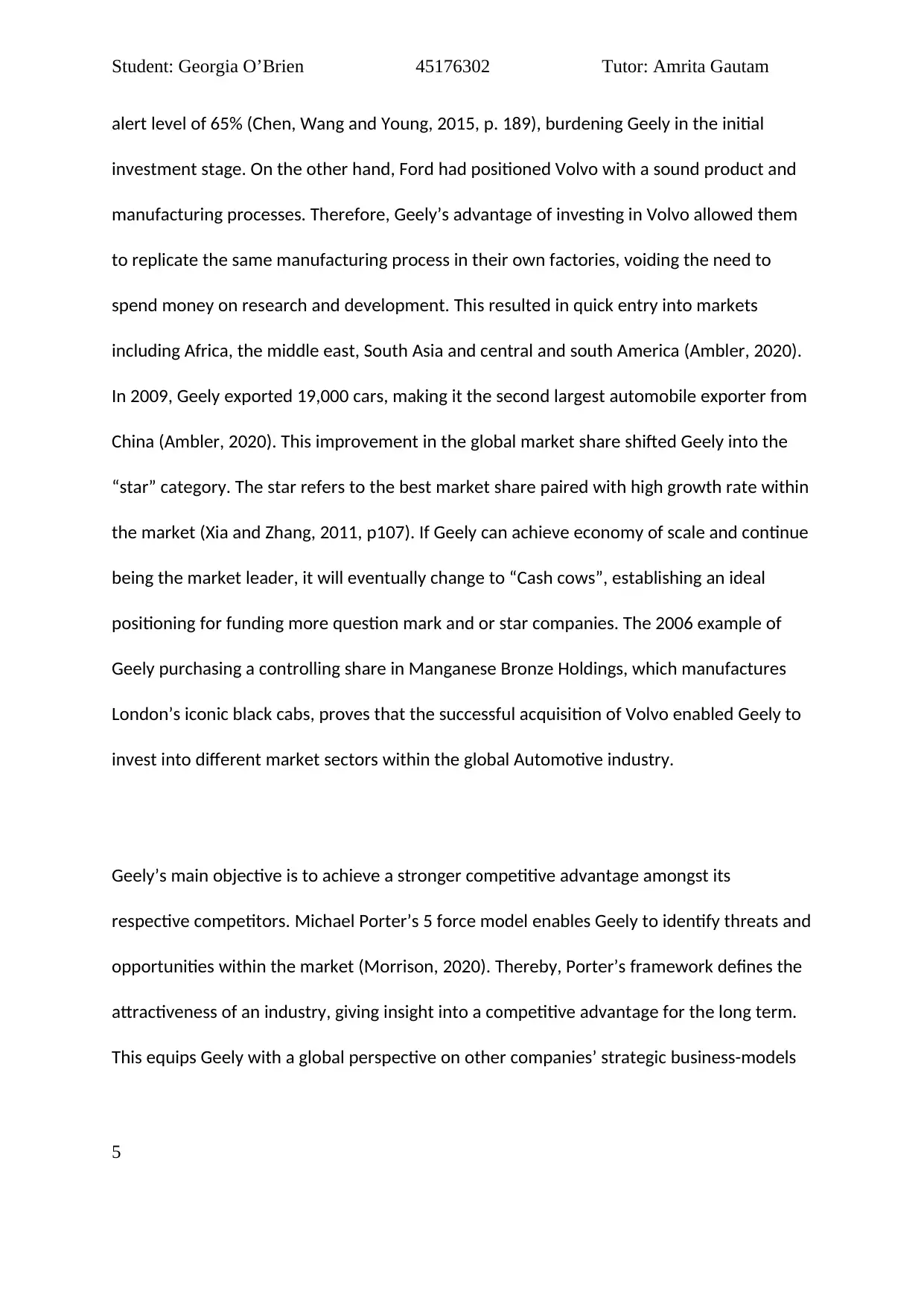
Student: Georgia O’Brien 45176302 Tutor: Amrita Gautam
alert level of 65% (Chen, Wang and Young, 2015, p. 189), burdening Geely in the initial
investment stage. On the other hand, Ford had positioned Volvo with a sound product and
manufacturing processes. Therefore, Geely’s advantage of investing in Volvo allowed them
to replicate the same manufacturing process in their own factories, voiding the need to
spend money on research and development. This resulted in quick entry into markets
including Africa, the middle east, South Asia and central and south America (Ambler, 2020).
In 2009, Geely exported 19,000 cars, making it the second largest automobile exporter from
China (Ambler, 2020). This improvement in the global market share shifted Geely into the
“star” category. The star refers to the best market share paired with high growth rate within
the market (Xia and Zhang, 2011, p107). If Geely can achieve economy of scale and continue
being the market leader, it will eventually change to “Cash cows”, establishing an ideal
positioning for funding more question mark and or star companies. The 2006 example of
Geely purchasing a controlling share in Manganese Bronze Holdings, which manufactures
London’s iconic black cabs, proves that the successful acquisition of Volvo enabled Geely to
invest into different market sectors within the global Automotive industry.
Geely’s main objective is to achieve a stronger competitive advantage amongst its
respective competitors. Michael Porter’s 5 force model enables Geely to identify threats and
opportunities within the market (Morrison, 2020). Thereby, Porter’s framework defines the
attractiveness of an industry, giving insight into a competitive advantage for the long term.
This equips Geely with a global perspective on other companies’ strategic business-models
5
alert level of 65% (Chen, Wang and Young, 2015, p. 189), burdening Geely in the initial
investment stage. On the other hand, Ford had positioned Volvo with a sound product and
manufacturing processes. Therefore, Geely’s advantage of investing in Volvo allowed them
to replicate the same manufacturing process in their own factories, voiding the need to
spend money on research and development. This resulted in quick entry into markets
including Africa, the middle east, South Asia and central and south America (Ambler, 2020).
In 2009, Geely exported 19,000 cars, making it the second largest automobile exporter from
China (Ambler, 2020). This improvement in the global market share shifted Geely into the
“star” category. The star refers to the best market share paired with high growth rate within
the market (Xia and Zhang, 2011, p107). If Geely can achieve economy of scale and continue
being the market leader, it will eventually change to “Cash cows”, establishing an ideal
positioning for funding more question mark and or star companies. The 2006 example of
Geely purchasing a controlling share in Manganese Bronze Holdings, which manufactures
London’s iconic black cabs, proves that the successful acquisition of Volvo enabled Geely to
invest into different market sectors within the global Automotive industry.
Geely’s main objective is to achieve a stronger competitive advantage amongst its
respective competitors. Michael Porter’s 5 force model enables Geely to identify threats and
opportunities within the market (Morrison, 2020). Thereby, Porter’s framework defines the
attractiveness of an industry, giving insight into a competitive advantage for the long term.
This equips Geely with a global perspective on other companies’ strategic business-models
5
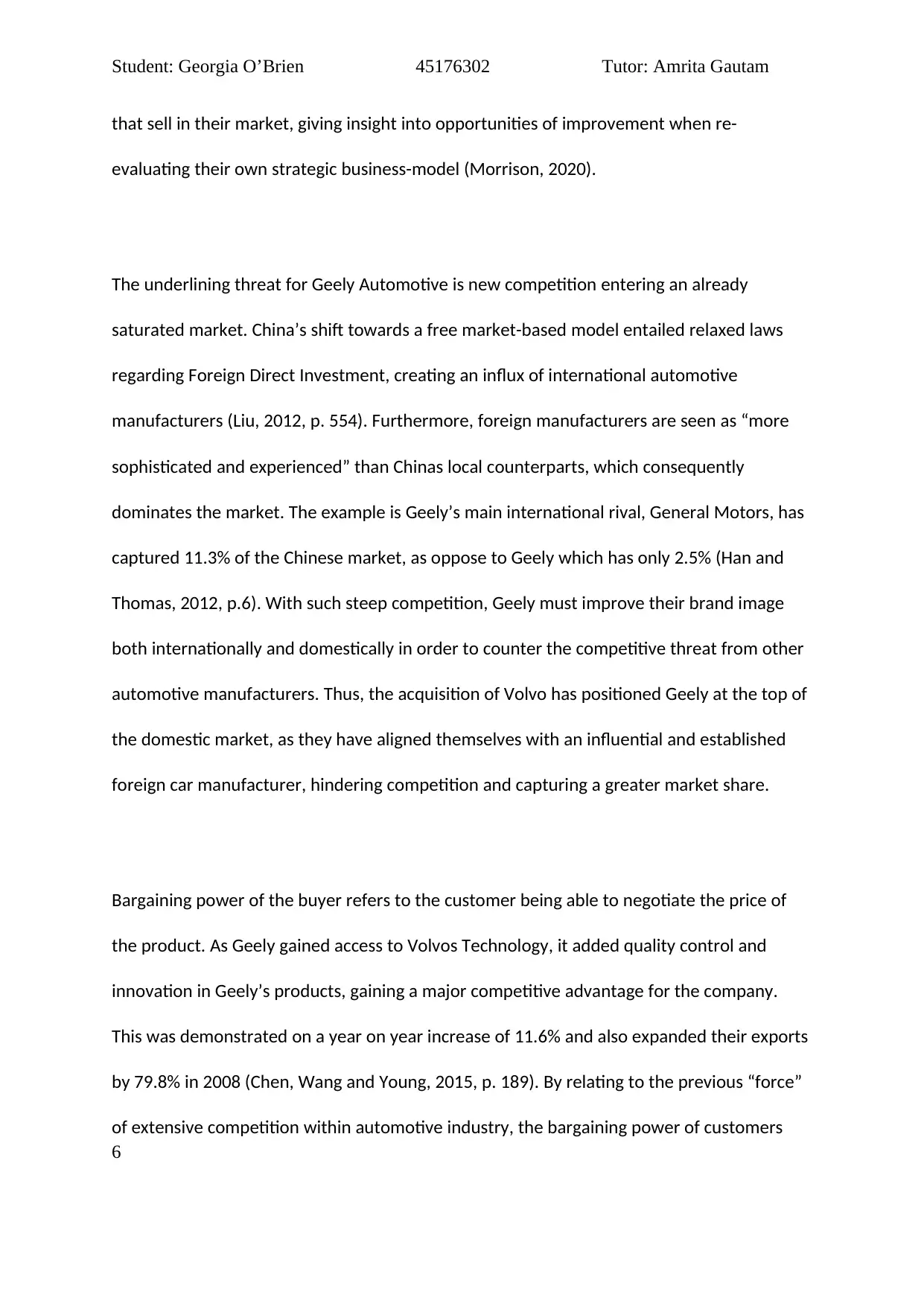
Student: Georgia O’Brien 45176302 Tutor: Amrita Gautam
that sell in their market, giving insight into opportunities of improvement when re-
evaluating their own strategic business-model (Morrison, 2020).
The underlining threat for Geely Automotive is new competition entering an already
saturated market. China’s shift towards a free market-based model entailed relaxed laws
regarding Foreign Direct Investment, creating an influx of international automotive
manufacturers (Liu, 2012, p. 554). Furthermore, foreign manufacturers are seen as “more
sophisticated and experienced” than Chinas local counterparts, which consequently
dominates the market. The example is Geely’s main international rival, General Motors, has
captured 11.3% of the Chinese market, as oppose to Geely which has only 2.5% (Han and
Thomas, 2012, p.6). With such steep competition, Geely must improve their brand image
both internationally and domestically in order to counter the competitive threat from other
automotive manufacturers. Thus, the acquisition of Volvo has positioned Geely at the top of
the domestic market, as they have aligned themselves with an influential and established
foreign car manufacturer, hindering competition and capturing a greater market share.
Bargaining power of the buyer refers to the customer being able to negotiate the price of
the product. As Geely gained access to Volvos Technology, it added quality control and
innovation in Geely’s products, gaining a major competitive advantage for the company.
This was demonstrated on a year on year increase of 11.6% and also expanded their exports
by 79.8% in 2008 (Chen, Wang and Young, 2015, p. 189). By relating to the previous “force”
of extensive competition within automotive industry, the bargaining power of customers
6
that sell in their market, giving insight into opportunities of improvement when re-
evaluating their own strategic business-model (Morrison, 2020).
The underlining threat for Geely Automotive is new competition entering an already
saturated market. China’s shift towards a free market-based model entailed relaxed laws
regarding Foreign Direct Investment, creating an influx of international automotive
manufacturers (Liu, 2012, p. 554). Furthermore, foreign manufacturers are seen as “more
sophisticated and experienced” than Chinas local counterparts, which consequently
dominates the market. The example is Geely’s main international rival, General Motors, has
captured 11.3% of the Chinese market, as oppose to Geely which has only 2.5% (Han and
Thomas, 2012, p.6). With such steep competition, Geely must improve their brand image
both internationally and domestically in order to counter the competitive threat from other
automotive manufacturers. Thus, the acquisition of Volvo has positioned Geely at the top of
the domestic market, as they have aligned themselves with an influential and established
foreign car manufacturer, hindering competition and capturing a greater market share.
Bargaining power of the buyer refers to the customer being able to negotiate the price of
the product. As Geely gained access to Volvos Technology, it added quality control and
innovation in Geely’s products, gaining a major competitive advantage for the company.
This was demonstrated on a year on year increase of 11.6% and also expanded their exports
by 79.8% in 2008 (Chen, Wang and Young, 2015, p. 189). By relating to the previous “force”
of extensive competition within automotive industry, the bargaining power of customers
6
⊘ This is a preview!⊘
Do you want full access?
Subscribe today to unlock all pages.

Trusted by 1+ million students worldwide
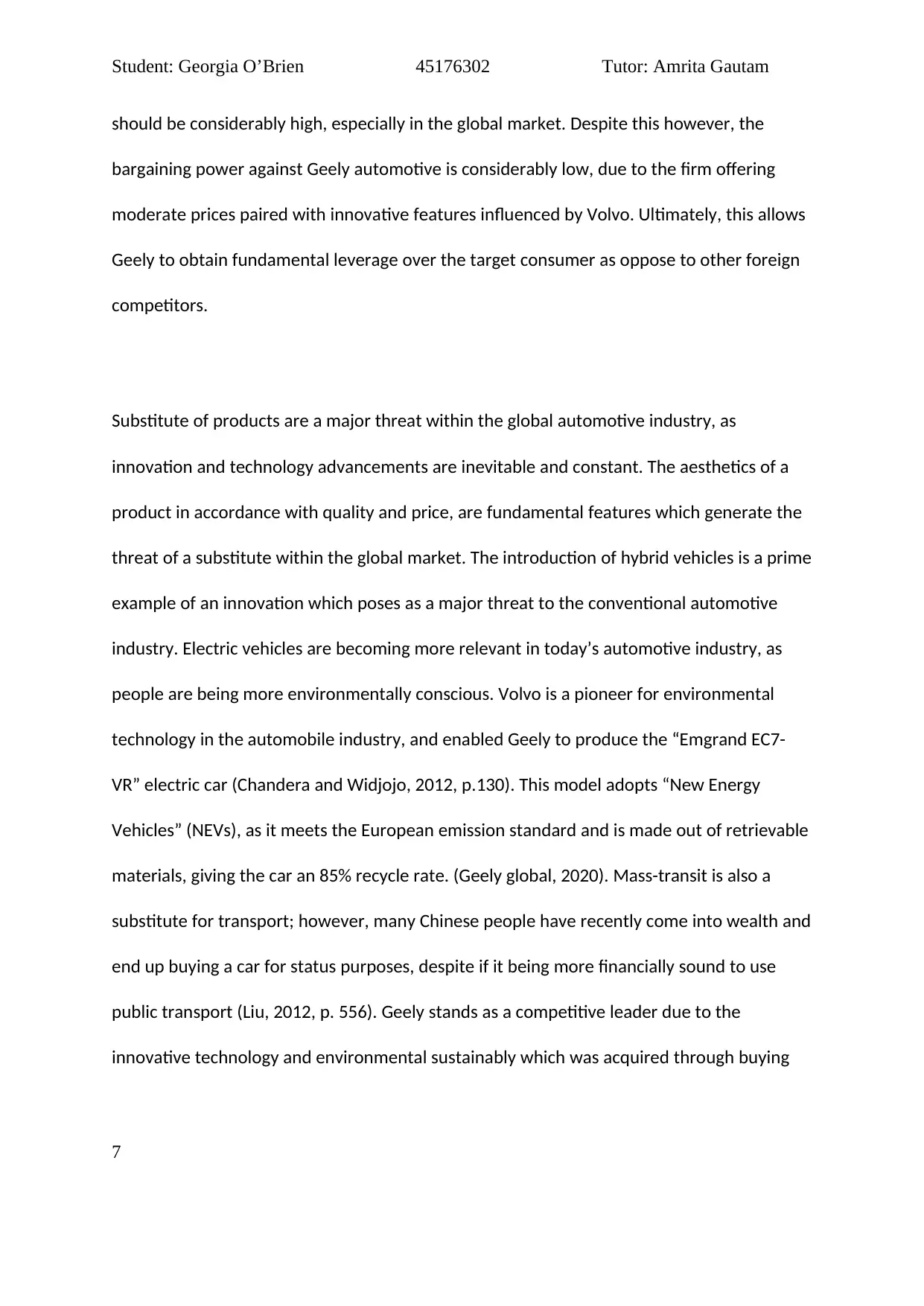
Student: Georgia O’Brien 45176302 Tutor: Amrita Gautam
should be considerably high, especially in the global market. Despite this however, the
bargaining power against Geely automotive is considerably low, due to the firm offering
moderate prices paired with innovative features influenced by Volvo. Ultimately, this allows
Geely to obtain fundamental leverage over the target consumer as oppose to other foreign
competitors.
Substitute of products are a major threat within the global automotive industry, as
innovation and technology advancements are inevitable and constant. The aesthetics of a
product in accordance with quality and price, are fundamental features which generate the
threat of a substitute within the global market. The introduction of hybrid vehicles is a prime
example of an innovation which poses as a major threat to the conventional automotive
industry. Electric vehicles are becoming more relevant in today’s automotive industry, as
people are being more environmentally conscious. Volvo is a pioneer for environmental
technology in the automobile industry, and enabled Geely to produce the “Emgrand EC7-
VR” electric car (Chandera and Widjojo, 2012, p.130). This model adopts “New Energy
Vehicles” (NEVs), as it meets the European emission standard and is made out of retrievable
materials, giving the car an 85% recycle rate. (Geely global, 2020). Mass-transit is also a
substitute for transport; however, many Chinese people have recently come into wealth and
end up buying a car for status purposes, despite if it being more financially sound to use
public transport (Liu, 2012, p. 556). Geely stands as a competitive leader due to the
innovative technology and environmental sustainably which was acquired through buying
7
should be considerably high, especially in the global market. Despite this however, the
bargaining power against Geely automotive is considerably low, due to the firm offering
moderate prices paired with innovative features influenced by Volvo. Ultimately, this allows
Geely to obtain fundamental leverage over the target consumer as oppose to other foreign
competitors.
Substitute of products are a major threat within the global automotive industry, as
innovation and technology advancements are inevitable and constant. The aesthetics of a
product in accordance with quality and price, are fundamental features which generate the
threat of a substitute within the global market. The introduction of hybrid vehicles is a prime
example of an innovation which poses as a major threat to the conventional automotive
industry. Electric vehicles are becoming more relevant in today’s automotive industry, as
people are being more environmentally conscious. Volvo is a pioneer for environmental
technology in the automobile industry, and enabled Geely to produce the “Emgrand EC7-
VR” electric car (Chandera and Widjojo, 2012, p.130). This model adopts “New Energy
Vehicles” (NEVs), as it meets the European emission standard and is made out of retrievable
materials, giving the car an 85% recycle rate. (Geely global, 2020). Mass-transit is also a
substitute for transport; however, many Chinese people have recently come into wealth and
end up buying a car for status purposes, despite if it being more financially sound to use
public transport (Liu, 2012, p. 556). Geely stands as a competitive leader due to the
innovative technology and environmental sustainably which was acquired through buying
7
Paraphrase This Document
Need a fresh take? Get an instant paraphrase of this document with our AI Paraphraser
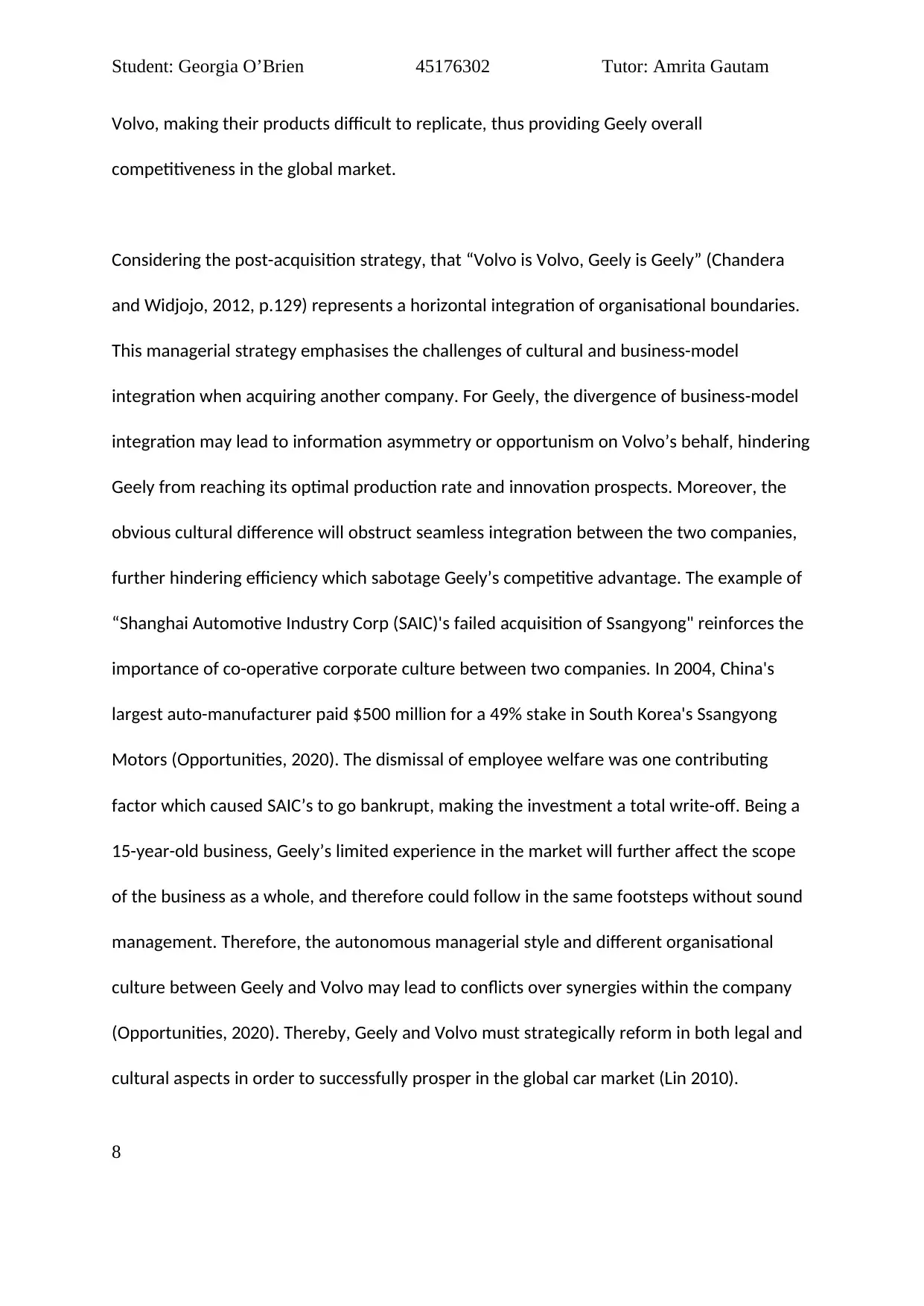
Student: Georgia O’Brien 45176302 Tutor: Amrita Gautam
Volvo, making their products difficult to replicate, thus providing Geely overall
competitiveness in the global market.
Considering the post-acquisition strategy, that “Volvo is Volvo, Geely is Geely” (Chandera
and Widjojo, 2012, p.129) represents a horizontal integration of organisational boundaries.
This managerial strategy emphasises the challenges of cultural and business-model
integration when acquiring another company. For Geely, the divergence of business-model
integration may lead to information asymmetry or opportunism on Volvo’s behalf, hindering
Geely from reaching its optimal production rate and innovation prospects. Moreover, the
obvious cultural difference will obstruct seamless integration between the two companies,
further hindering efficiency which sabotage Geely’s competitive advantage. The example of
“Shanghai Automotive Industry Corp (SAIC)'s failed acquisition of Ssangyong" reinforces the
importance of co-operative corporate culture between two companies. In 2004, China's
largest auto-manufacturer paid $500 million for a 49% stake in South Korea's Ssangyong
Motors (Opportunities, 2020). The dismissal of employee welfare was one contributing
factor which caused SAIC’s to go bankrupt, making the investment a total write-off. Being a
15-year-old business, Geely’s limited experience in the market will further affect the scope
of the business as a whole, and therefore could follow in the same footsteps without sound
management. Therefore, the autonomous managerial style and different organisational
culture between Geely and Volvo may lead to conflicts over synergies within the company
(Opportunities, 2020). Thereby, Geely and Volvo must strategically reform in both legal and
cultural aspects in order to successfully prosper in the global car market (Lin 2010).
8
Volvo, making their products difficult to replicate, thus providing Geely overall
competitiveness in the global market.
Considering the post-acquisition strategy, that “Volvo is Volvo, Geely is Geely” (Chandera
and Widjojo, 2012, p.129) represents a horizontal integration of organisational boundaries.
This managerial strategy emphasises the challenges of cultural and business-model
integration when acquiring another company. For Geely, the divergence of business-model
integration may lead to information asymmetry or opportunism on Volvo’s behalf, hindering
Geely from reaching its optimal production rate and innovation prospects. Moreover, the
obvious cultural difference will obstruct seamless integration between the two companies,
further hindering efficiency which sabotage Geely’s competitive advantage. The example of
“Shanghai Automotive Industry Corp (SAIC)'s failed acquisition of Ssangyong" reinforces the
importance of co-operative corporate culture between two companies. In 2004, China's
largest auto-manufacturer paid $500 million for a 49% stake in South Korea's Ssangyong
Motors (Opportunities, 2020). The dismissal of employee welfare was one contributing
factor which caused SAIC’s to go bankrupt, making the investment a total write-off. Being a
15-year-old business, Geely’s limited experience in the market will further affect the scope
of the business as a whole, and therefore could follow in the same footsteps without sound
management. Therefore, the autonomous managerial style and different organisational
culture between Geely and Volvo may lead to conflicts over synergies within the company
(Opportunities, 2020). Thereby, Geely and Volvo must strategically reform in both legal and
cultural aspects in order to successfully prosper in the global car market (Lin 2010).
8
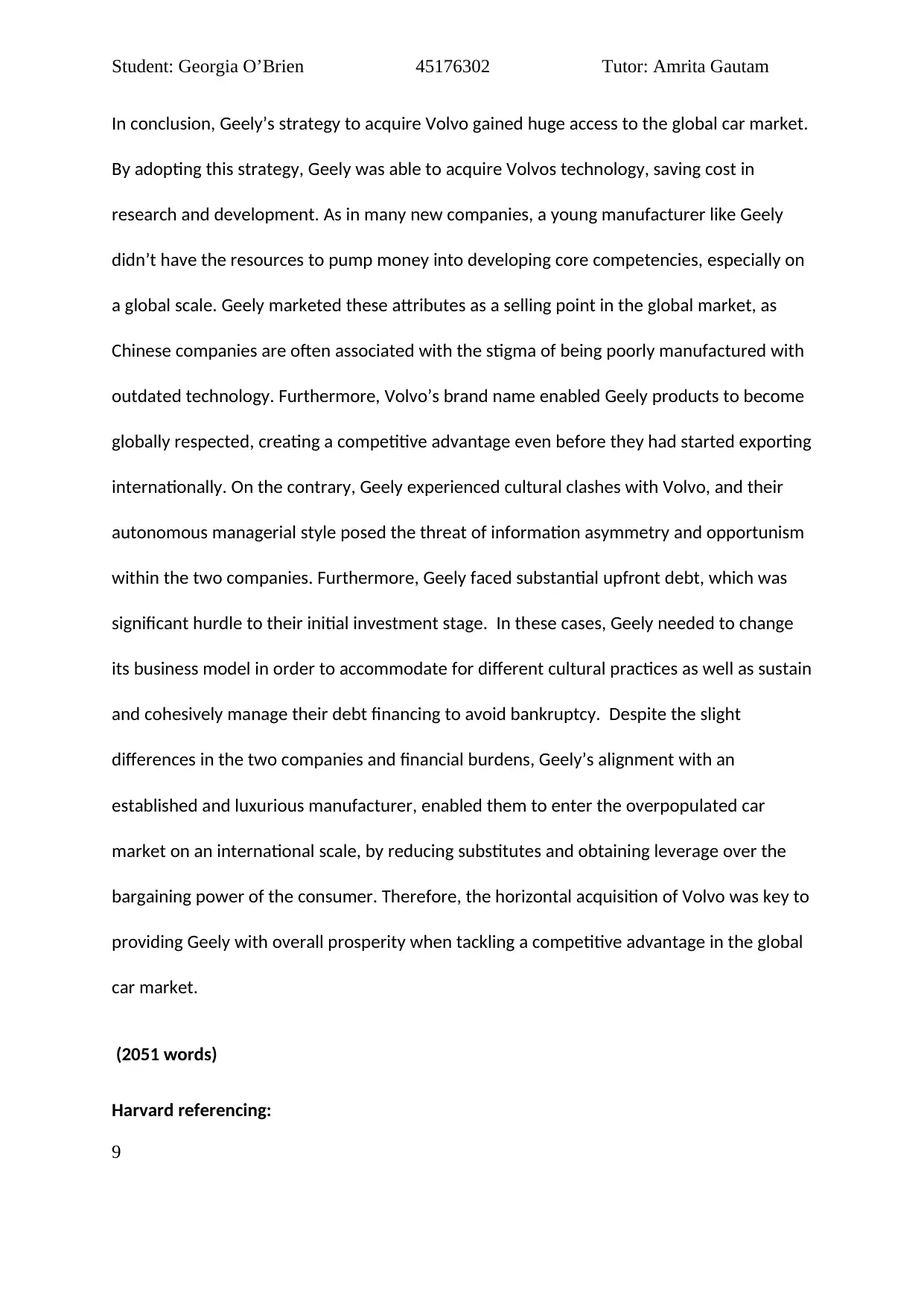
Student: Georgia O’Brien 45176302 Tutor: Amrita Gautam
In conclusion, Geely’s strategy to acquire Volvo gained huge access to the global car market.
By adopting this strategy, Geely was able to acquire Volvos technology, saving cost in
research and development. As in many new companies, a young manufacturer like Geely
didn’t have the resources to pump money into developing core competencies, especially on
a global scale. Geely marketed these attributes as a selling point in the global market, as
Chinese companies are often associated with the stigma of being poorly manufactured with
outdated technology. Furthermore, Volvo’s brand name enabled Geely products to become
globally respected, creating a competitive advantage even before they had started exporting
internationally. On the contrary, Geely experienced cultural clashes with Volvo, and their
autonomous managerial style posed the threat of information asymmetry and opportunism
within the two companies. Furthermore, Geely faced substantial upfront debt, which was
significant hurdle to their initial investment stage. In these cases, Geely needed to change
its business model in order to accommodate for different cultural practices as well as sustain
and cohesively manage their debt financing to avoid bankruptcy. Despite the slight
differences in the two companies and financial burdens, Geely’s alignment with an
established and luxurious manufacturer, enabled them to enter the overpopulated car
market on an international scale, by reducing substitutes and obtaining leverage over the
bargaining power of the consumer. Therefore, the horizontal acquisition of Volvo was key to
providing Geely with overall prosperity when tackling a competitive advantage in the global
car market.
(2051 words)
Harvard referencing:
9
In conclusion, Geely’s strategy to acquire Volvo gained huge access to the global car market.
By adopting this strategy, Geely was able to acquire Volvos technology, saving cost in
research and development. As in many new companies, a young manufacturer like Geely
didn’t have the resources to pump money into developing core competencies, especially on
a global scale. Geely marketed these attributes as a selling point in the global market, as
Chinese companies are often associated with the stigma of being poorly manufactured with
outdated technology. Furthermore, Volvo’s brand name enabled Geely products to become
globally respected, creating a competitive advantage even before they had started exporting
internationally. On the contrary, Geely experienced cultural clashes with Volvo, and their
autonomous managerial style posed the threat of information asymmetry and opportunism
within the two companies. Furthermore, Geely faced substantial upfront debt, which was
significant hurdle to their initial investment stage. In these cases, Geely needed to change
its business model in order to accommodate for different cultural practices as well as sustain
and cohesively manage their debt financing to avoid bankruptcy. Despite the slight
differences in the two companies and financial burdens, Geely’s alignment with an
established and luxurious manufacturer, enabled them to enter the overpopulated car
market on an international scale, by reducing substitutes and obtaining leverage over the
bargaining power of the consumer. Therefore, the horizontal acquisition of Volvo was key to
providing Geely with overall prosperity when tackling a competitive advantage in the global
car market.
(2051 words)
Harvard referencing:
9
⊘ This is a preview!⊘
Do you want full access?
Subscribe today to unlock all pages.

Trusted by 1+ million students worldwide
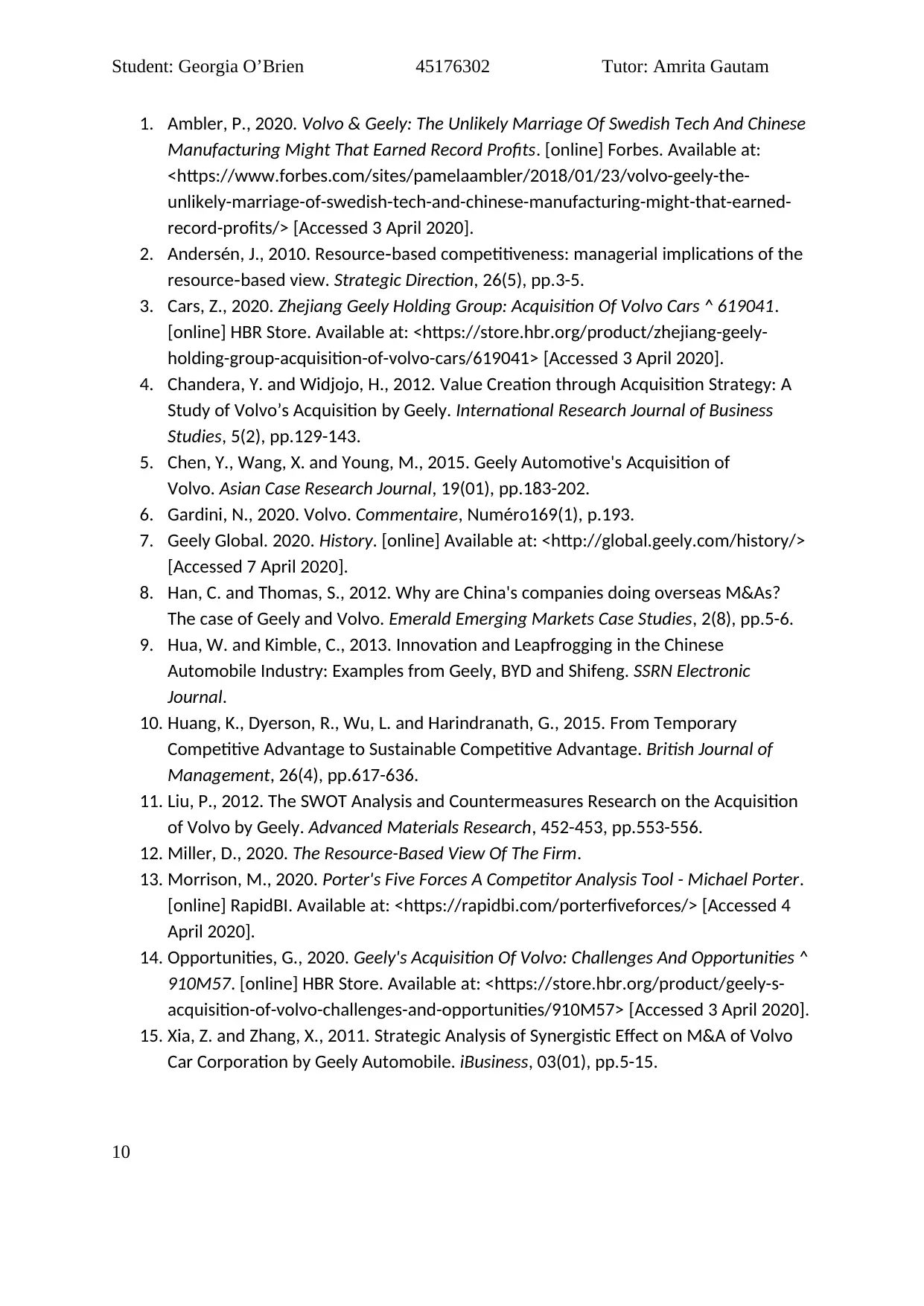
Student: Georgia O’Brien 45176302 Tutor: Amrita Gautam
1. Ambler, P., 2020. Volvo & Geely: The Unlikely Marriage Of Swedish Tech And Chinese
Manufacturing Might That Earned Record Profits. [online] Forbes. Available at:
<https://www.forbes.com/sites/pamelaambler/2018/01/23/volvo-geely-the-
unlikely-marriage-of-swedish-tech-and-chinese-manufacturing-might-that-earned-
record-profits/> [Accessed 3 April 2020].
2. Andersén, J., 2010. Resource‐based competitiveness: managerial implications of the
resource‐based view. Strategic Direction, 26(5), pp.3-5.
3. Cars, Z., 2020. Zhejiang Geely Holding Group: Acquisition Of Volvo Cars ^ 619041.
[online] HBR Store. Available at: <https://store.hbr.org/product/zhejiang-geely-
holding-group-acquisition-of-volvo-cars/619041> [Accessed 3 April 2020].
4. Chandera, Y. and Widjojo, H., 2012. Value Creation through Acquisition Strategy: A
Study of Volvo’s Acquisition by Geely. International Research Journal of Business
Studies, 5(2), pp.129-143.
5. Chen, Y., Wang, X. and Young, M., 2015. Geely Automotive's Acquisition of
Volvo. Asian Case Research Journal, 19(01), pp.183-202.
6. Gardini, N., 2020. Volvo. Commentaire, Numéro169(1), p.193.
7. Geely Global. 2020. History. [online] Available at: <http://global.geely.com/history/>
[Accessed 7 April 2020].
8. Han, C. and Thomas, S., 2012. Why are China's companies doing overseas M&As?
The case of Geely and Volvo. Emerald Emerging Markets Case Studies, 2(8), pp.5-6.
9. Hua, W. and Kimble, C., 2013. Innovation and Leapfrogging in the Chinese
Automobile Industry: Examples from Geely, BYD and Shifeng. SSRN Electronic
Journal.
10. Huang, K., Dyerson, R., Wu, L. and Harindranath, G., 2015. From Temporary
Competitive Advantage to Sustainable Competitive Advantage. British Journal of
Management, 26(4), pp.617-636.
11. Liu, P., 2012. The SWOT Analysis and Countermeasures Research on the Acquisition
of Volvo by Geely. Advanced Materials Research, 452-453, pp.553-556.
12. Miller, D., 2020. The Resource-Based View Of The Firm.
13. Morrison, M., 2020. Porter's Five Forces A Competitor Analysis Tool - Michael Porter.
[online] RapidBI. Available at: <https://rapidbi.com/porterfiveforces/> [Accessed 4
April 2020].
14. Opportunities, G., 2020. Geely's Acquisition Of Volvo: Challenges And Opportunities ^
910M57. [online] HBR Store. Available at: <https://store.hbr.org/product/geely-s-
acquisition-of-volvo-challenges-and-opportunities/910M57> [Accessed 3 April 2020].
15. Xia, Z. and Zhang, X., 2011. Strategic Analysis of Synergistic Effect on M&A of Volvo
Car Corporation by Geely Automobile. iBusiness, 03(01), pp.5-15.
10
1. Ambler, P., 2020. Volvo & Geely: The Unlikely Marriage Of Swedish Tech And Chinese
Manufacturing Might That Earned Record Profits. [online] Forbes. Available at:
<https://www.forbes.com/sites/pamelaambler/2018/01/23/volvo-geely-the-
unlikely-marriage-of-swedish-tech-and-chinese-manufacturing-might-that-earned-
record-profits/> [Accessed 3 April 2020].
2. Andersén, J., 2010. Resource‐based competitiveness: managerial implications of the
resource‐based view. Strategic Direction, 26(5), pp.3-5.
3. Cars, Z., 2020. Zhejiang Geely Holding Group: Acquisition Of Volvo Cars ^ 619041.
[online] HBR Store. Available at: <https://store.hbr.org/product/zhejiang-geely-
holding-group-acquisition-of-volvo-cars/619041> [Accessed 3 April 2020].
4. Chandera, Y. and Widjojo, H., 2012. Value Creation through Acquisition Strategy: A
Study of Volvo’s Acquisition by Geely. International Research Journal of Business
Studies, 5(2), pp.129-143.
5. Chen, Y., Wang, X. and Young, M., 2015. Geely Automotive's Acquisition of
Volvo. Asian Case Research Journal, 19(01), pp.183-202.
6. Gardini, N., 2020. Volvo. Commentaire, Numéro169(1), p.193.
7. Geely Global. 2020. History. [online] Available at: <http://global.geely.com/history/>
[Accessed 7 April 2020].
8. Han, C. and Thomas, S., 2012. Why are China's companies doing overseas M&As?
The case of Geely and Volvo. Emerald Emerging Markets Case Studies, 2(8), pp.5-6.
9. Hua, W. and Kimble, C., 2013. Innovation and Leapfrogging in the Chinese
Automobile Industry: Examples from Geely, BYD and Shifeng. SSRN Electronic
Journal.
10. Huang, K., Dyerson, R., Wu, L. and Harindranath, G., 2015. From Temporary
Competitive Advantage to Sustainable Competitive Advantage. British Journal of
Management, 26(4), pp.617-636.
11. Liu, P., 2012. The SWOT Analysis and Countermeasures Research on the Acquisition
of Volvo by Geely. Advanced Materials Research, 452-453, pp.553-556.
12. Miller, D., 2020. The Resource-Based View Of The Firm.
13. Morrison, M., 2020. Porter's Five Forces A Competitor Analysis Tool - Michael Porter.
[online] RapidBI. Available at: <https://rapidbi.com/porterfiveforces/> [Accessed 4
April 2020].
14. Opportunities, G., 2020. Geely's Acquisition Of Volvo: Challenges And Opportunities ^
910M57. [online] HBR Store. Available at: <https://store.hbr.org/product/geely-s-
acquisition-of-volvo-challenges-and-opportunities/910M57> [Accessed 3 April 2020].
15. Xia, Z. and Zhang, X., 2011. Strategic Analysis of Synergistic Effect on M&A of Volvo
Car Corporation by Geely Automobile. iBusiness, 03(01), pp.5-15.
10
1 out of 10
Related Documents
Your All-in-One AI-Powered Toolkit for Academic Success.
+13062052269
info@desklib.com
Available 24*7 on WhatsApp / Email
![[object Object]](/_next/static/media/star-bottom.7253800d.svg)
Unlock your academic potential
Copyright © 2020–2026 A2Z Services. All Rights Reserved. Developed and managed by ZUCOL.





